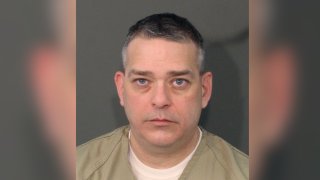
The former police officer accused of killing Andre Hill interacted “two to three” times with Hill before the shooting and became concerned he was a burglar, the officer’s attorney said Friday, as he defended his client with never-before-heard details about the night of the fatal shooting.
The comments on behalf of now-fired Columbus Police Officer Adam Coy came as a magistrate set an unusually high bond of $3 million for the ex-officer and Coy pleaded not guilty to murder and other charges.
The officer's attorney, Mark Collins, said the white officer and Hill, a Black man, had the interactions before police body camera footage shows Coy shooting the 47-year-old as he emerged from a garage holding a cellphone with his left hand and his right hand not visible.
The alleged details had not been disclosed in the information Columbus police and the Ohio Attorney General's office have put out since the Dec. 22 shooting. Collins said state criminal investigators interviewed Coy soon after the shooting took place and the transcripts of that interview are only now being released since there has been an indictment in the case.
“In our conversations with our client, we have a timeline of what occurred and it’s been corroborated,” Collins told reporters outside the courtroom Friday.
The timeline, according to Collins, is that Coy arrived at the northwest Columbus neighborhood where the nonemergency call had been made about someone turning their car on and off after 1 a.m. The first interaction between the two men took place while Hill was sitting in his car, Collins said. Coy gave Hill a verbal command to which he did not respond, Collins said.
There were two more interactions between the two men before Coy can be seen on bodycam footage shooting Hill. When asked why Coy did not turn on his body camera at any point during those interactions, Collins said it was because Coy was investigating what he thought at the time was a potential burglary.
U.S. & World
Footage released days after the shooting showed one of the residents of the home where Hill was visiting that night telling officers that Hill was a friend who had come to drop off Christmas money.
As far as the $3 million bail, Collins said he plans to ask the judge to reconsider, calling the amount inappropriate in comparison to the bail set in the cases of other on-duty police killings in the past year.
“Even the officer in the George Floyd case was given a $1 million bond and this case is nothing like that in any way, shape or form,” Collins said after the hearing. “Our client had a good faith basis to believe that the individual had a silver revolver and he responded. He’s done everything that’s been asked of him. And this $3 million bond is just what we feel inappropriate.”
A $3 million bond seems unusually high compared to most Ohio murder bonds, which are typically set at $1 million, said Ric Simmons, an Ohio State University law professor. Factors such as the danger a defendant poses to the community or a history of not showing up in court could lead to higher bonds, he said.
In Coy’s case, he has no criminal record, has lived most of his life in Ohio, and did not flee while knowing for weeks charges were likely coming, Simmons said.
“Although he has had multiple allegations of improper force against him as a police officer, there is nothing in his record to make him seem like he is dangerous to others now that he is off the force and has presumably surrendered all firearms,” he said.
Coy was indicted by a grand jury Wednesdayfollowing a monthlong investigation by the Ohio Attorney General's Office into the fatal shooting.
Franklin County Court Magistrate Elizabeta Saken set the bond after Collins unsuccessfully argued for a bond between $25,000 and $250,000.
The Ohio Attorney General's Office, which is prosecuting Coy, argued that the high bond was necessary given the facts of the case. Saken also ordered Coy not to have contact with any witnesses in the case, including other police officers. Republican Attorney General Dave Yost, Ohio's top law enforcement official, said he was pleased with the bond.
The charges faced by Coy, a 19-year member of the force, also include failure to use his body camera and failure to tell another officer he believed Hill presented a danger.
While Hill's family welcomed the news of Coy's indictment, data shows and experts conclude that Yost and the prosecution team will face a hard battle to secure a conviction.
Only 46% of cases of on-duty police shootings in which murder or manslaughter charges were brought over the past 16 years ended up in convictions, according to data compiled by Philip Stinson, a criminal justice professor at Bowling Green State University in Ohio.
The overall rate for murder convictions among the general population is about 70%, according to U.S. Bureau of Justice Statistics data.
Collins, Coy's attorney, has already signaled a possible defense for their case. On Wednesday, he said Coy will fight the charges based on U.S. Supreme Court case law that examines such use of force incidents through the eyes of a “reasonable police officer."
Collins added that his client has fully cooperated with investigators up until this point and “honestly believed that he saw a silver revolver coming up in the right hand of the individual.”
___
Farnoush Amiri is a corps member for the Associated Press/Report for America Statehouse News Initiative. Report for America is a nonprofit national service program that places journalists in local newsrooms to report on undercovered issues.



